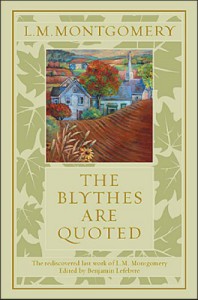Not what I expected

What a melancholy book. (There will be some spoilers here for the story of the Blythe family: be warned.) A collection of stories in which the Blythes are more or less tangential – "quoted", bracketed by post-Great War snippets of Blythe conversation and poetry by Anne and Walter. Actually, in a fair number of them the Blythes are loathed, which feels strange – and, to LMM's credit, is not necessarily an indicator of whether we ought to like the character doing the loathing. Some are bad 'uns – but not all.
Oh, Walter.
There are some strange patterns in the stories collected in The Blythes Are Quoted. Those who don't like Anne ("Uncle Stephen did not like the Blythes ... he said he did not like educated women" … "Nobody in the Brewster clan, it seemed, approved of the Blythes" … "Miss Shelley could not conceive of Mrs. Blythe cherishing bitterness for thirty years. She liked her but she thought her too shallow for that.") and who feel slighted by them ("I hinted it to Dr. Blythe ... and such a snub as he gave me! And Dr. Blythe can give snubs when he wants to, I can assure you.") As I said, it's unsettling to run into this attitude.
Then there is an alarming theme of animal abuse, looked at completely differently than we do now ("Even if you'd taken the money and burned the binder house I'd have wanted you" – this to someone who killed a dog and a cat and chickens and a goat; "'what he did to the kitten' ... That memory was intolerable") – and, on a similar track, fox farms. In three separate stories foxes are mentioned as a commodity. Odd.
There was also a sort of a theme of unresolved questions. "Epworth Rectory. I don't think that mystery has ever been solved." "Susan, to herself:-'I could tell them the story of that fiddle if I liked. But I won't. It's too sad.'" (Thank you, Susan – there was enough sadness in this book as it was.)
There are still all the things I've always loved about L.M. Montgomery's writing: humor ("Chrissie felt much better. 'In about twenty years or so I'll be pretty well over it,' she said") and pathos (not always a bad thing) and solid story-telling. But this is the dark side, keeping uppermost in my mind throughout the book that Lucy Maud took her own life. Grief and haunting and regret and pain … there are still happy endings. But the interspersed Blythe reminiscences and conversation are a reminder that "happily ever after" never takes into account wars and the deaths of children. It was surprisingly hard to read … I don't think The Blythes Are Quoted is going to be part of my semi-annual LMM-reread.
Oh, Walter.
There are some strange patterns in the stories collected in The Blythes Are Quoted. Those who don't like Anne ("Uncle Stephen did not like the Blythes ... he said he did not like educated women" … "Nobody in the Brewster clan, it seemed, approved of the Blythes" … "Miss Shelley could not conceive of Mrs. Blythe cherishing bitterness for thirty years. She liked her but she thought her too shallow for that.") and who feel slighted by them ("I hinted it to Dr. Blythe ... and such a snub as he gave me! And Dr. Blythe can give snubs when he wants to, I can assure you.") As I said, it's unsettling to run into this attitude.
Then there is an alarming theme of animal abuse, looked at completely differently than we do now ("Even if you'd taken the money and burned the binder house I'd have wanted you" – this to someone who killed a dog and a cat and chickens and a goat; "'what he did to the kitten' ... That memory was intolerable") – and, on a similar track, fox farms. In three separate stories foxes are mentioned as a commodity. Odd.
There was also a sort of a theme of unresolved questions. "Epworth Rectory. I don't think that mystery has ever been solved." "Susan, to herself:-'I could tell them the story of that fiddle if I liked. But I won't. It's too sad.'" (Thank you, Susan – there was enough sadness in this book as it was.)
There are still all the things I've always loved about L.M. Montgomery's writing: humor ("Chrissie felt much better. 'In about twenty years or so I'll be pretty well over it,' she said") and pathos (not always a bad thing) and solid story-telling. But this is the dark side, keeping uppermost in my mind throughout the book that Lucy Maud took her own life. Grief and haunting and regret and pain … there are still happy endings. But the interspersed Blythe reminiscences and conversation are a reminder that "happily ever after" never takes into account wars and the deaths of children. It was surprisingly hard to read … I don't think The Blythes Are Quoted is going to be part of my semi-annual LMM-reread.
 5
5






